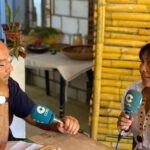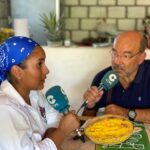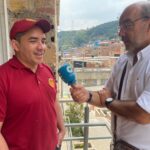Radio COPE travels to Colombia to discover the work of BBVA Microfinance Foundation
La Linterna, the radio program directed by the renowned journalist Ángel Expósito, has been switched on from the headquarters of Bancamía, the BBVA Microfinance Foundation's entity in Colombia. The objective: to shed light on the reality of the most vulnerable populations in Latin America - those exposed to inequality, which, far from improving, has increased as a result of the pandemic.

In such circumstances, the work of organizations like the BBVAMF is much needed to promote the talent of those with fewer resources. As BBVA Chairman Carlos Torres Vila said at the start of the program, “Microfinance makes a crucial difference in the lives of these entrepreneurs and makes a difference in creating opportunities for these people and making their ideas the beginning of something much bigger.”
To check it out, Expósito's team traveled to the Department of Caquetá, on the border with Ecuador, where Ninfa Herrera -a member of the huitoto ethnic group- settled after fleeing the armed conflict and where today she cooks for a living, but also maintains the legacy of her people, defending its heritage. In this mission, she has been supported by the BBVA Microfinance Foundation, through the ‘Productive Enterprises for Peace’ (Empropaz) initiative which, in alliance with the United States Agency for International Development (USAID), supports the inclusion of the poorest areas of the country, which have historically been excluded from basic services such as financial services.

Ángel Expósito, journalist, talks to Ninfa's daughter about the restaurant and the support of the BBVA Microfinance Foundation
According to Jonathan Cendales, the Empropaz advisor who works with Ninfa, the first step is to “verify the business idea and see the person's profile. This allows them to assess the potential of the venture and from there, he says, “a tailor-made training path is defined.” For Ninfa, having the support of the BBVAMF has been fundamental, as she said on the radio: “They have supported me so that I could take this enterprise forward, which is not only about coming to buy fish, but also coming to learn about the culture of the Amazon and strengthen the culture of indigenous women.”
Opportunities for Venezuelan migrants too
Empropaz, which includes access to capital once the business plan has been consolidated and training in business management and financial education has been received, also works with Venezuelan migrants, who cross the border to start afresh away from social, economic and political instability.
That is why COPE also heard the voice of Frederick Camargo, one of the 2.26 million Venezuelan migrants in Colombia, according to the National Administrative Department of Statistics (DANE). A population that faces many barriers to access the financial system. According to a survey by the Observatorio del Proyecto Migración Venezuela, around 46 percent of the Venezuelans interviewed believe that they do not meet the necessary requirements to have a savings account, and 18 percent claim that they have been denied opening an account due to lack of documentation.
But when given the opportunity, as Bancamía gave Frederick, the impact is twofold: with his income, this Bogotá-based entrepreneur contributes to the development of his host country and his native Venezuela, where his children live. “Empropaz helped me see life in a different way. It helped me to absorb the big blow of having to leave Venezuela, live away from my relatives and start over in a place where nobody knows me,” he said to COPE.,

Ángel Expósito talks to Frederick Camargo, Venezuelan entrepreneur supported by the BBVA Microfinance Foundation in Colombia
During the show, Expósito showed his respect for the tremendous transformation behind microfinance. “Words cannot describe what you can get with a micro loan, looking at these women, with their dignity, it is an economic miracle.” That’s why examples such as Ninfa, Frederick or Sandra Ceballos, who was also featured in La Linterna, show that looking at the other side of the Atlantic is not only necessary, but also urgent.